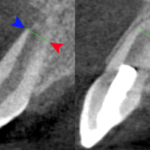
Regenerative endodontics are a relatively new field that uses concepts from tissue engineering with the aim of restoring root-canals to a health state that would allow for continued development of the root and surrounding tissue.
The aim of this review was to evaluate the outcomes for non-vital immature permanent teeth treated using regenerative endodontic techniques (RET)
Methods
Searches were conducted in the Medline/PubMed, Embase, Embase Classic, Cochrane Central Register of Controlled trials (Central), Clinical trials.gov and National Research Register databases. The PROSPERO protocol indicates that Controlled trials, Case-control studies, Cohort studies and Case-series with a minimum of 5 cases were considered.
Two reviewers assessed study quality. The Newcastle-Ottawa Scale was used to assess the quality of cohort and case-control studies with randomised controlled trials being assessed with the Cochrane Risk of Bias tool. The Scottish Intercollegiate Guidelines Network Grading System was used to grade the level of evidence of all studies.
Outcome measures assessed included tooth survival, qualitative assessments of clinical and radiographic signs and symptoms of periapical healing, quantitative measurements of continued root development, root lengthening, root dentin thickening, and/or relative radiographic area calculations. Random effects meta-analysis were performed for studies with similar exposures including blood clot (BC), platelet-rich plasma (PRP), and the control group (mineral trioxide aggregate [MTA] apical plug technique)
Results
- 14 studies involving a total of 409 patients were included (sample sizes range from 6-88)
- 5 studies were RCTs, 2 cohorts,1 case-control and 6 uncontrolled prospective.
- All the RCTs were considered to be at a high risk of bias.
- All except 1 study had a follow up of at least 1 year,
- Resolution of clinical signs and symptoms was high across studies irrespective of the intervention or control group.
- Tooth survival was 100% in all but 2 studies. All studies reported on apical closures
| Blood clot (95%CI) | Platelet-rich plasma (95% CI) | Control (95% CI) | |
| Periapical healing | 95%(78-97%) | 94% (74–99%) | 91% (64–98%) |
| Apical closure | 76% (58–88%) | 82% (57–94%] | 6.4% (0.9–35%) |
| Root Length & Root Dentin Thickness. | 80% (48–95%) | 94% (55–99% | 6.4% (0.5–46%) |
Conclusions
The authors concluded: –
Many knowledge gaps still exist within the studies published. Current published evidence is unable to provide definitive conclusions on the predictability
Comments
This review of a developing area of research and treatment has used a broad search strategy to locate relevant studies. While key methodological details are given in the main paper the level of detail provided is limited making it difficult to assess. Although some additional detail can be found by viewing the original protocol on the PROSPERO database. Fourteen relatively small studies were included involving 2 main regenerative techniques using blood clots and platelet-rich plasma. Although 5 studies were randomised controlled trials these were all considered to be at high risk of bias. The sample sizes of all the included studies was relatively small and there was substantial heterogeneity between the studies in terms of reporting pre- and post-operative clinical findings and variation in reporting outcomes. While the review suggests excellent success rates the majority of the included studies are uncontrolled and those controlled trials are at high risk of bias. Consequently, these findings should be viewed with caution until more high quality well-conducted and reported studies are available.
Links
Primary paper
Tong HJ, Rajan S, Bhujel N, Kang J, Duggal M, Nazzal H. Regenerative Endodontic Therapy in the Management of Nonvital Immature Permanent Teeth: A Systematic Review-Outcome Evaluation and Meta-analysis. J Endod. 2017Sep;43(9):1453-1464. doi: 10.1016/j.joen.2017.04.018. Epub 2017 Jul 22. Review. PubMed PMID: 28743431.
Other references
Original review protocol on PROSPERO
Picture credits

Hi Derek,
Thanks for sharing this information.
[…] Regenerative endodontics in non-vital immature permanent teeth […]